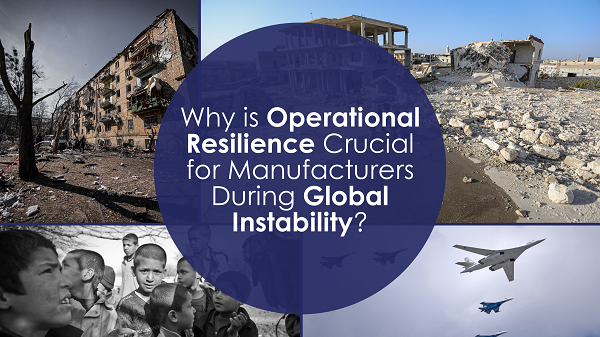Why is Operational Resilience Crucial for Manufacturers During Global Instability?

In today’s rapidly changing global landscape, manufacturers face numerous challenges, from supply chain disruptions to workforce shortages. One significant yet often overlooked factor is the impact of geopolitical instability.
For manufacturing operations managers and directors, understanding the importance of operational resilience during periods of global instability is essential for sustaining business continuity and protecting the bottom line.
This blog will explore why operational resilience matters and how manufacturers can fortify their operations against unexpected disruptions.
Mitigating Supply Chain Disruptions
Global instability can wreak havoc on supply chains, causing delays, shortages, and increased costs. Manufacturers that depend on a global network of suppliers are particularly vulnerable. By focusing on operational resilience, manufacturers can better prepare for and mitigate these disruptions.
- Diversify Suppliers: Relying on a single supplier or geographic region for critical components can be risky. By diversifying suppliers and sourcing from multiple regions, manufacturers can reduce the impact of regional disruptions.
- Inventory Management: Maintaining strategic reserves of critical materials and components can buffer against supply chain interruptions. Implementing just-in-case inventory strategies alongside just-in-time practices ensures a balance between efficiency and preparedness.
Other blogs you may be interested in:
Safeguarding Workforce and Operations
During times of global instability, the workforce is often impacted through disruptions such as political unrest, natural disasters, or economic sanctions. Ensuring the safety and availability of skilled workers is vital for maintaining production levels and meeting customer demands.
- Employee Safety Plans: Develop and regularly update comprehensive safety plans that address various scenarios, including evacuation procedures, communication protocols, and remote work capabilities.
- Cross-Training and Flexibility: By cross-training employees, manufacturers can ensure that critical operations can continue even if some team members are unavailable. Flexible workforce strategies, including the use of temporary or contract workers, can also help fill gaps during turbulent times.
Other blogs you may be interested in:
Enhancing Physical and Cyber Security
Global instability also increases the risk of both physical and cyber threats. Manufacturers must bolster their security measures to protect their assets, intellectual property, and operational integrity.
- Physical Security Measures: Implement robust physical security protocols such as access controls, surveillance systems, and secure facilities to protect against theft, vandalism, and espionage.
- Cybersecurity Strategies: Invest in advanced cybersecurity measures, including firewalls, encryption, and regular security audits. Train employees on cybersecurity best practices and develop incident response plans to quickly address any breaches.
Other blogs you may be interested in:
Operational resilience is not just about surviving global instability; it’s about thriving despite it. By proactively addressing potential supply chain disruptions, safeguarding their workforce, and enhancing physical and cyber security, manufacturers can ensure sustained operations and maintain their competitive edge. As manufacturing operations managers and directors, investing in resilience strategies today will prepare your business to navigate and overcome tomorrow’s uncertainties.
By understanding and implementing these resilience strategies, manufacturers can make better-informed decisions, ultimately safeguarding their operations and ensuring long-term success in an unpredictable world.
This content has been generated with the assistance of artificial intelligence (AI). While AI technology was used to draft and develop the initial content, it has been thoroughly reviewed, edited, and fact checked by Luke to ensure accuracy and relevance. We strive to provide high-quality and trustworthy information, but please be aware that AI-generated content may contain errors or omissions. We take full responsibility for the final content presented here and are committed to maintaining transparency and integrity in our use of AI technology.





